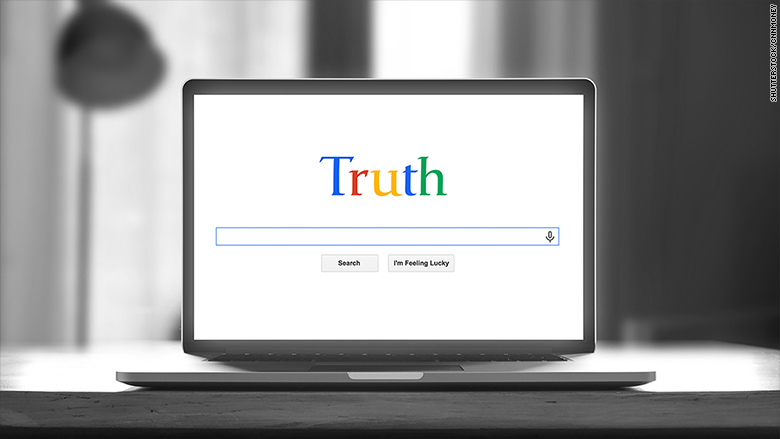It was a good run, 1997-2015 but combined with the European Commission finding that Google results favored Google products, without disclosing that bit-o-"truth", this pretty much puts a fork in it.
Mark my words.
From CNN Money:
It must be true, I found it on the Internet!
Naive? Maybe. After all, cyberspace has its fair share of myths. Now Google may have found a way to clean house, or at least throw the trash in the basement.
The company is figuring out how to rank websites by the veracity of their content. The more truthful the page, the higher up it would appear in search results.
Google (GOOG) currently sorts search results based on criteria such as the number of links pointing at the website, the amount of time users spend on it, as well as the prominence of its social media profile.
The algorithm, named PageRank after Google co-founder Larry Page, is supposed to rank websites based on their reputation.

But a team of Google engineers and research scientists say the current system mainly reflects the popularity of a website, which may tell users little about its truthfulness.The Financial Times has a slightly different approach to the story:
Gossip websites are good example, according to the Google team. While immensely popular, they are not generally considered very reliable.
To fix the problem, Google has come up with a new truth-seeking algorithm, describing it in a research paper first reported by New Scientist.
So how would it work? The new algorithm draws on Google's "Knowledge Vault" -- a collection of 2.8 billion facts extracted from the Internet....MORE
Wittgenstein, #TheDress and Google’s search for a bigger truth
The ‘wisdom of crowds’ rankings could mean sites dealing in rumour fall below more credible sources
As the world burnt with a BuzzFeed-prompted debate over whether a dress was black and blue or white and gold, the BBC published a short article posing the question everyone was surely asking: “What would Wittgenstein say about that dress?”Wittgenstein, #TheDress and Google's search for a bigger truth
Wittgenstein died in 1951, so we cannot know if the philosopher of language, truth and context would have been a devotee of BuzzFeed. (I guess it depends on whether we are talking of the early or the late Ludwig. The early Wittgenstein, it is well known, was something of an enthusiast for LOLs, whereas the later was more into WTFs and OMGs.)
The dress will now join the pantheon of web phenomena such as “Diet Coke and Mentos” and “Charlie bit my finger”. But this trivial debate on perceived truth captured in miniature a wider issue for the web: how to distil fact from noise when opinion drowns out information and value is determined by popularity.
At about the same time as the dress was turning the air blue — or was it white? — the New Scientist published a report on how one web giant might tackle this problem, a development in which Wittgenstein might have been very interested. The magazine reported on a Google research paper about how the company might reorder its search rankings to promote sites that could be trusted to tell the truth. (Google produces many such papers a year so this is a long way short of official policy.) It posits a formula for finding and promoting sites with a record of reliability.This raises an interesting question over how troubled we should be by the notion that a private company with its own commercial interests and a huge concentration of power could be the arbiter of truth. There is no current reason to see sinister motives in Google’s search for a better web: it is both honourable and good business. But one might ask how, for example, Google Truth might determine established truths on net neutrality.
The other striking thing about the idea is an implicit shift in attitudes to the web in the Google paper. For the methodology proposes a move away from the wisdom of crowds and back towards established authority. As a journalist for an established authority, I can see the upsides — but it is a long way from how Google works now.
It is fair to say a research paper that talks on page one of “a scalable algorithm for performing inference and parameter estimation in the proposed probabilistic model” will soon touch the edges of your correspondent’s intellectual envelope. Put crudely, it proposes using the presence of verifiable facts and the absence of demonstrably false information to provide a trust rating for individual websites. Current Google search rankings draw signals of quality from the number of people who link to a site. This “wisdom of crowds” approach to rankings means popular sites that deal in rumour and conspiracy theories can secure the same prominence in the search rankings as more credible sources....MORE